
Sugar
The food-and-eczema connection is a bit murky, but there are a few obvious no-nos, says Dr. Buka. “Avoid foods you are allergic to, and it’s a good idea to stay away from food and drinks high in sugar. Sugar has been directly linked to eczema flare-ups thanks to its role in insulin levels and inflammation,” he explains. Because inflammation is such a strong trigger for eczema, Dr. Buka strongly encourages patients to adopt a diet rich in fiber — it helps tamp down inflammation.
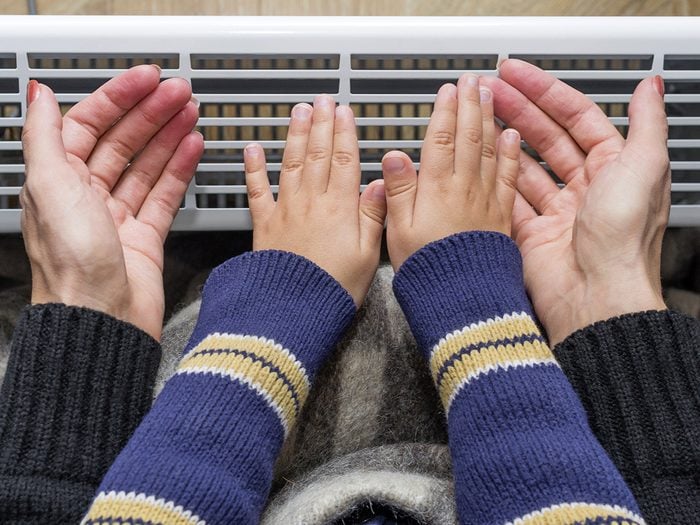
Eczema causes: Heater air
Winter means warm meals, cozy blankets, and another log on the fire. But it also means a dry, overheated home, which can significantly aggravate eczema symptoms. Heater air affects humidity levels, which in turn disrupts the skin’s hydration balance. According to Jeffrey Fromowitz, MD, “One of the most significant flaring features is dry skin; this can occur during winter months when the heat is on and the air is low in humidity. Moisturizing your skin regularly as a proactive measure can be effective in reducing the outbreak of eczema.”

Formaldehyde
This highly hazardous chemical is actually more common than you’d think. According to the National Eczema Association, “Formaldehyde is in many places including household disinfectants, vaccines, glues and adhesives, cigarette smoke, and embalming fluid. Formaldehyde-releasing preservatives are in personal care products such as cosmetics, and may trigger some individuals who are allergic to formaldehyde.” If you’ve been experiencing unexplainable flare-ups lately, scan all nearby products to reduce potential exposure.
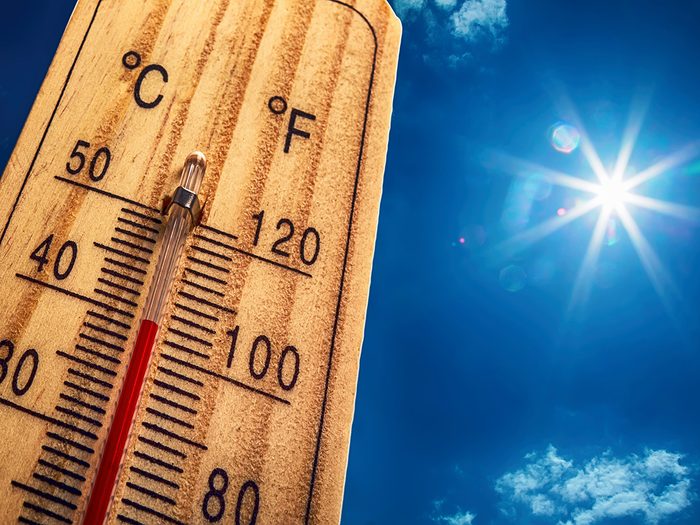
Temperature changes
Any extreme temperatures — hot or cold — or sudden weather changes can dehydrate your skin, leaving it cracked and agitated. According to Bobby Buka, MD, “The cause of eczema is a missing protein called filaggrin, which is the glue that ties skin cells together. Without filaggrin, the skin cells are loosely joined, and much-needed moisture more readily evaporates from the skin. When the temperature is either too hot or too cold, it throws off the homeostasis of eczema patients whose skin barrier is already impaired.” The main aim should be to maintain an even skin temperature and apply moisturizer as a barrier.
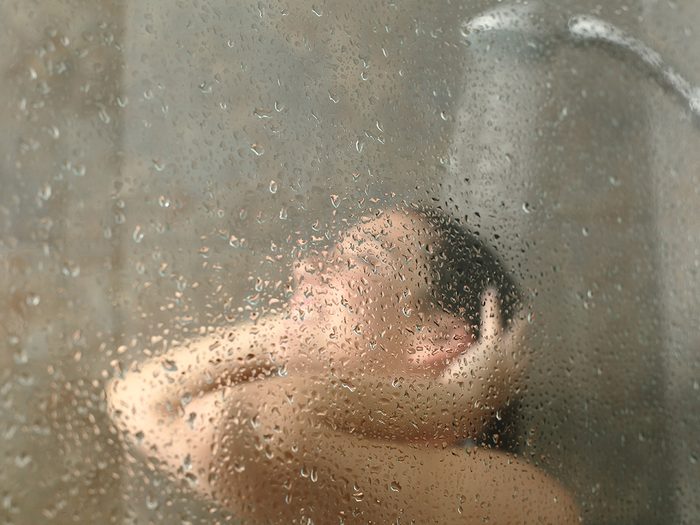
Hot water
While a nice hot shower or bath may feel great, it’s not doing your skin any favors. Prolonged exposure to hot water can strip the skin of natural oils, causing angry and inflamed patches. In fact, Dr. Buka suggests that people with any type of atopic dermatitis limit their water exposure to ten minutes or less; also, try to settle for cool or lukewarm water. After you bathe, apply moisturizer to your damp, towel-dried skin to help lock in hydration.
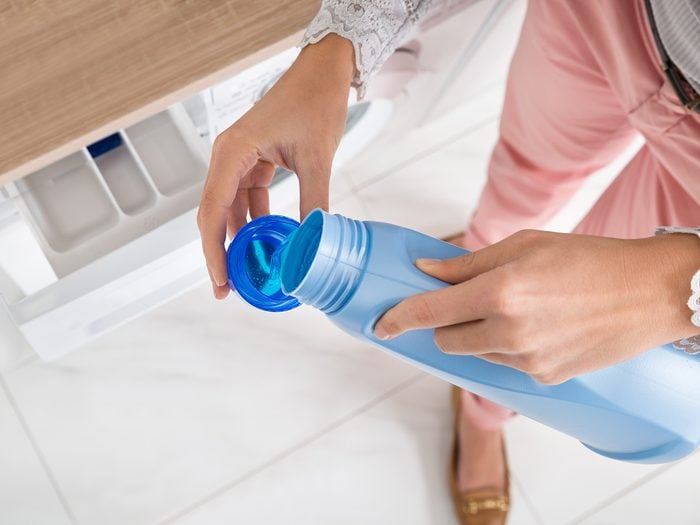
Detergent
Unfortunately, most detergents will irritate your eczema: A residue builds up in your clothes, towels, and linens over time, according to Jennifer Roberge, founder of The Eczema Company. “This means clothing, towels, and bedding washed in detergent can expose the skin to an unfavorable alkaline environment all day and all night long.” Try using detergents designed for sensitive skin, and consider running laundry through a second rinse cycle to remove any soapy residue.

Fragrance
Dermatologist Tsippora Shainhouse MD, FAAD recommends strongly that you avoid soaps with any fragrance. “The label should say ‘fragrance-free,’ not ‘unscented.’ Unscented products use a masking fragrance to get rid of the scent. For soaps and skin care products, look for ones that reinforce a normal skin pH to help maintain a healthy, intact skin barrier.”

Stress
When you’re tense, your stress hormones trigger inflammation that can irritate your skin. According to Hal Weitzbuch, MD, MS, FAAD, founder of JuveTress, “Stress alters our body’s natural innate steroid levels, which affect our immune system and how it reacts. In general, higher stress levels correlates with worsening eczema.” Avoiding stress isn’t always possible, but you can learn to manage your response: Check out these 8 ways to relieve stress fast.

Sunscreen
Ingredients in sunscreen — oxy and avobenzone — can aggravate your skin and lead to excessive itching. According to Victoria A. Cirillo-Hyland, MD, “If this is the case, stay cool in the shade. Always wear physical sunscreens, like zinc oxide or titanium dioxide, which tend to be less irritating than chemical sunscreens.”
10 Sunscreen Lies You Believe That Make Your Dermatologist Cringe
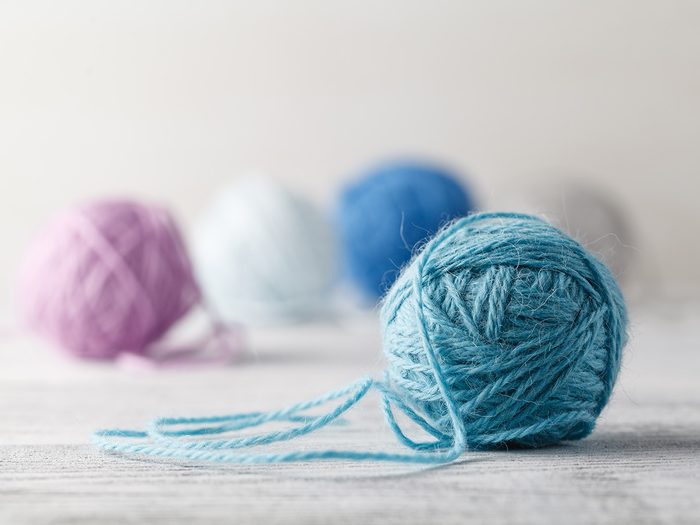
Wool
“Friction is your enemy when you have dry, irritated skin,” says Adria Ali, founder of Everyday Essence and Skin Therapy. “The rough textures can be like sandpaper to the surface of your skin. To stop the cycle of irritation, avoid abrasive clothing such as wool, mohair, and polyester.” Choose clothes made with a loose weave and breathable fibers to avoid flare-ups. On the plus side, you now have an excuse not to wear that scratchy sweater you got for Christmas.

Hand sanitizer
People with eczema would be wise to steer clear of alcohol-based antibacterial gels altogether. According to Ali, “Not only will these products dry out your skin, they’ve also been found to disrupt the ‘good bacteria’ that naturally lives on your skin. Disrupting this healthy bacteria can break down the natural barrier that acts to protect you in your daily life from bacteria, germs, and potential viruses.”
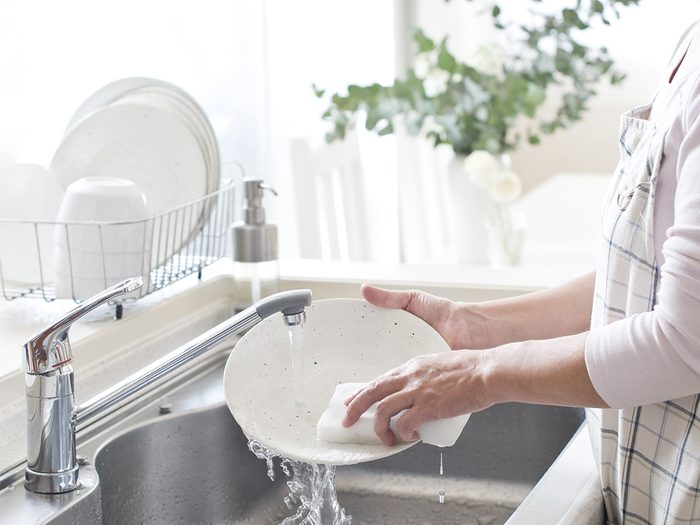
Dish soap
Hand soaps, bar soaps, and especially dish soaps often contain harsh chemicals that aggravate eczema. According to Ali, “When doing dishes, use plastic gloves that have a cotton lining. The gloves will protect your hands from the drying detergent, and the cotton-lined interior helps your skin to breathe while staying protected.”

Sweat
The salt in your sweat can irritate eczema. According to Tina Bhutani, MD, “For many people with eczema, perspiring during humid summer days, exercising in a warm gym, or exposure to dry central heating during the winter months can trigger a flare-up.” As a general rule of thumb, try to refrain from excessive sun exposure and wear sweat-resistant clothing during exercise.
This Is Why You Sweat So Much — And Others Sweat Less Than You Do
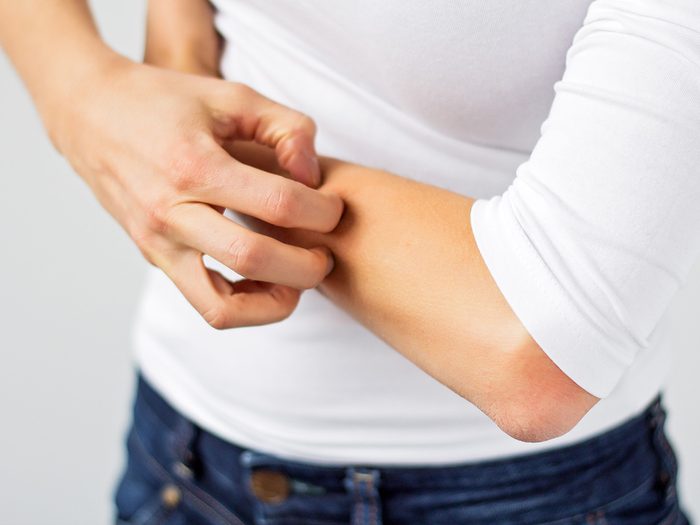
Scratching
Doctors frequently refer to eczema as “the itch that rashes.” A flare leads to itchy skin, you scratch the itch, and the rash gets worse — and itchier. If you keep scratching, you can break the skin and spread your eczema. To reduce temptation, keep your nails short and keep your rash covered. For immediate relief, the American Academy of Dermatology recommends applying a cool compress or adding colloidal oatmeal to your skincare routine.

Pet dander
Your dog, cat, or gerbil could be making your eczema much worse. Many household allergens contribute to flare-ups, explains Dr. Buka: “These can be particles of pet dander, dust mites, and even cockroach dander floating all around you.” You don’t have to get rid of your furry friends, but you will need to be more attentive to house cleaning. Another solution from Dr. Buka: “Outfit your bathroom or bedroom with a humidifier that adds more moisture to the air, weighing down those particles with water and dragging them to the ground before they can get into airways or onto the skin.”
